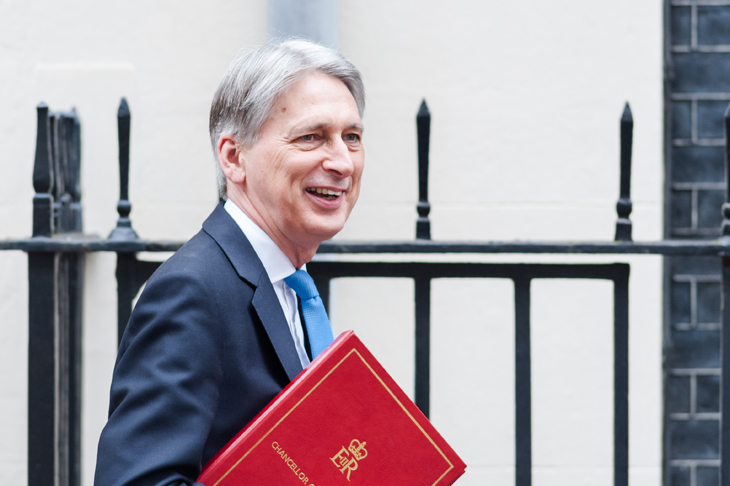‘Uncertainty is draining investment from the UK, with Brexit having a negative impact on eight in ten businesses,’ says Carolyn Fairbairn of the CBI. OK, let’s pause for a chorus of ‘She would say that, wouldn’t she?’ But even if we shade off for ‘scaremongering’, her survey (of 236 firms) is bleak: ‘44 per cent of businesses with contingency plans intend to stockpile goods… 30 per cent intend to relocate production and services overseas… 15 per cent intend to move jobs…’ And I’ve seen no rival surveys that contradict the gist of it. So what can Monday’s Budget do to make business feel better?
Suggestions abound, and Chancellor Hammond is not as hobbled as he might have been since higher-than-expected tax receipts have made it a little easier for him to meet the Prime Minister’s promise of extra NHS spending, which is his biggest headache. Here’s my own round-up of recommendations, starting with the smaller businesses that are the lifeblood of any economy in difficult times. Don’t discourage them by cutting the VAT threshold from its current level of £83,000 annual turnover, but do find more ways to relieve them of business rates, particularly where they bring disused premises back to use. And don’t abolish the incentive of entrepreneurs’ relief, which allows the first £10 million gains on selling a business to be taxed at only 10 per cent.
As for bigger businesses, don’t be tempted to raise corporation tax from the relatively low rate of 19 per cent which is generating record receipts; indeed, tinker as little as possible, since tax complexity adds another layer of disincentive to investment. Don’t rush into a hastily drafted ‘Amazon tax’ on online sales, because it will hit consumers and domestic web-based businesses while the global tech giants dance around it. And do find the odd billion to sustain scientific research that might otherwise be lost as we leave the EU.
But with so many ‘don’ts’, where will Hammond find any new money? Stand by for pain on pension reliefs, fuel duties and income tax thresholds. And if he’s looking for a gimmick, what’s the silliest proposal in current circulation? That would be tax breaks on gym membership and home fitness equipment, designed to boost the nation’s exercise levels. But Spectator readers know that’s better achieved by walking the dog, so let’s throw vets’ bills into the formula too. ‘Golden retriever relief’: there’s an eyecatcher for you, Chancellor.
Dogged by scandal
My call for a suggested new name for RBS generated a thin postbag. ‘Banky McBankface’ had a certain whimsy but ‘Dogger Bank’ — evidently a reference to what goes on in dark car parks rather than to the blameless North Sea shallows — needed too much explaining. More seriously, many of you thought the bailed-out bank should not try to spin a new image that implies the bad old days are over when in fact they are not. In particular, the unresolved issue of mistreatment of thousands of small and medium-sized (SME) business customers by RBS’s restructuring arm GRG — accused of profiting from the sale of assets of companies the bank had forced into administration — has left a lingering stench.
To recap, a consultants’ report for the Financial Conduct Authority in 2016 identified ‘widespread inappropriate treatment of customers by GRG… that in a significant proportion of cases… appears likely to have caused material financial distress’. But the report also concluded that RBS could not be acted against by the regulator; nor were victims likely to gain satisfaction in court. So any hope of redress or reform was left to RBS’s board, which not only denied the allegations in the first place and was accused by Treasury select committee chairman Andrew Tyrie of being ‘wilfully obtuse’ about them — but also closed down the accounts of the businessman Lawrence Tomlinson who (at the behest of Vince Cable as business secretary) wrote an earlier report on GRG’s brutal modus operandi.
The FCA (apparently for fear of being sued by RBS) released only a redacted version of the 2016 report but the Treasury select committee, now with Nicky Morgan in the chair, published it in full this February. Despite its impact, FCA chief Andrew Bailey confirmed sheepishly in July that no disciplinary action would follow — enabling RBS chairman Sir Howard Davies to wax lyrical about a new era under a new name, and his underlings to garner headlines such as this week’s ‘RBS diverts £2 billion to help SMEs handle Brexit’.
But the scandal has not been buried. The RBS GRG Business Action Group has vowed to carry on a legal fight on behalf of hundreds of affected firms. Another report this week called for a beefing up of the Financial Ombudsman Service to support SMEs that feel wronged by their banks. And my own local MP Kevin Hollinrake, co-chair of the All-Party Parliamentary Group for Fair Business Banking, has gone one better and called for a public inquiry, having concluded that RBS (and other banks) have been ‘shockingly’ protected by the FCA rather than held properly to account. Hollinrake also wins my competition: RBS, he says, is the Untouchable Bank.
Facebook’s snake
Even in an era of unbridled abuse of politicians, it may seem harsh to call Sir Nick Clegg a snake. But in the great board game of corporate fortunes, ‘Discredited and all but forgotten former Lib Dem leader becomes your head of global affairs’ seems unlikely to herald an upward-pointing ladder for Facebook, troubled as the social media giant already is with allegations of lax data security, devious tax arrangements and hosting platforms for terrorists and subversives. The Clegg appointment might even turn out to be a snake as slippery as ‘Gordon Brown opens your new London HQ and says your great company can look forward with hope’. That, back in 2004, was the curse of doom for Lehman Brothers.
Got something to add? Join the discussion and comment below.
Get 10 issues for just $10
Subscribe to The Spectator Australia today for the next 10 magazine issues, plus full online access, for just $10.
You might disagree with half of it, but you’ll enjoy reading all of it. Try your first month for free, then just $2 a week for the remainder of your first year.















Comments
Don't miss out
Join the conversation with other Spectator Australia readers. Subscribe to leave a comment.
SUBSCRIBEAlready a subscriber? Log in